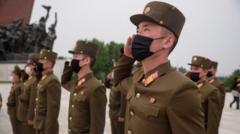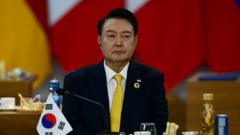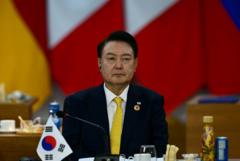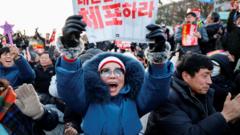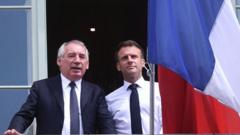The impeachment of President Yoon Suk Yeol has left South Korea without an elected leader, creating a potential political vacuum that could last several months as the Constitutional Court deliberates his future.
South Korea Faces Political Uncertainty After Impeachment of President Yoon Suk Yeol

South Korea Faces Political Uncertainty After Impeachment of President Yoon Suk Yeol
In the wake of his impeachment, South Korea grapples with a leadership void as interim Prime Minister steps forward.
After a decisive vote by the National Assembly to impeach Yoon on Saturday, celebrations erupted among supporters of the ruling parties. However, the country's political landscape now hangs in the balance, with interim Prime Minister Han Duck-soo assuming leadership duties during this tumultuous period. The Constitutional Court now wades through a process that could take up to six months to rule on whether Yoon will be reinstated or formally ousted.
With three vacancies on the court, the National Assembly is set to appoint justices before the deliberation begins. If Yoon is formally expelled, the nation faces an additional two-month period to organize a presidential election. Yoon, amid his political turmoil, proclaimed that he would "never give up" his fight to reclaim office, while simultaneously facing myriad criminal investigations, including serious charges of insurrection. He has been called to answer prosecutors' questions but notably failed to appear for the inquiry.
The mishandling of various controversies, including Yoon's controversial call for martial law, has deeply undermined public trust, complicating South Korea's political future. Understanding the ramifications of this unstable political climate is critical as both supporters and opponents of Yoon watch closely on the next steps towards addressing the leadership void.
With three vacancies on the court, the National Assembly is set to appoint justices before the deliberation begins. If Yoon is formally expelled, the nation faces an additional two-month period to organize a presidential election. Yoon, amid his political turmoil, proclaimed that he would "never give up" his fight to reclaim office, while simultaneously facing myriad criminal investigations, including serious charges of insurrection. He has been called to answer prosecutors' questions but notably failed to appear for the inquiry.
The mishandling of various controversies, including Yoon's controversial call for martial law, has deeply undermined public trust, complicating South Korea's political future. Understanding the ramifications of this unstable political climate is critical as both supporters and opponents of Yoon watch closely on the next steps towards addressing the leadership void.

